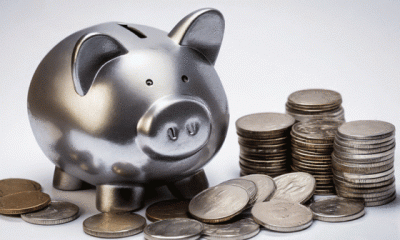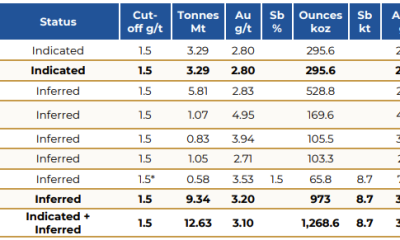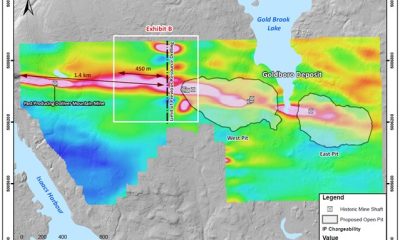Precious Metals
Election May Shape Turkey’s Financial Future
We’re just weeks away from Turkey’s May 15 presidential and parliamentary elections, which are likely the most important Turkish elections in a generation….


We’re just weeks away from Turkey’s May 15 presidential and parliamentary elections, which are likely the most important Turkish elections in a generation. President Tayyip Erdoğan, who has been in power for 20 years, is behind in the polls, and a victory for the opposition party could change the direction of Turkey, both politically and economically, with potential far-reaching effects on its debt.
Here’s how we think about the risks and opportunities for investors.
Why are the elections important?
During the 20 years that Erdoğan has held power under various guises, he appears to have increasingly relied on a set of economic policies that many consider unorthodox to maintain growth, moved the geopolitical focus away from the West, and concentrated power in the presidency.
The opposition is campaigning to reverse these policies. Economically, we believe the most important of which the opposition has committed to overturn many of Erdoğan’s unpopular domestic policies, including central-bank independence. Geopolitically, the opposition is likely to be less hostile to the West, potentially forging closer ties with both the United States and Europe. In our opinion, it would also like to return Turkey to a parliamentary system.
What are the chances of an opposition win?
In our opinion, the opposition has its best chance yet of beating Erdoğan because six of the opposition parties, including the second- and third-largest, have united in a single alliance.
Moreover, since Turkey’s last election, 4 million voters have come of age and 2 million have passed away, swinging the pendulum slightly toward the opposition, in our view.
We believe the opposition holds a slender advantage in both the presidential and parliamentary elections.
However, the opposition’s agreed-upon candidate is Kemal Kilicdaroglu, the leader of the Republican People’s Party (or Cumhuriyet Halk Partisi, CHP), which is currently the main opposition party. This is likely seen as not ideal, as Kilicdaroglu has lost to Erdoğan many times in election run-offs, and may be seen as uncharismatic, weak, and (at age 75) old.
Still, Kilicdaroglu has nominated the mayor of Ankara, Mansur Yavas, and the mayor of Istanbul, Ekrem Imamoglu, as his vice presidents should the opposition win. Yavas and Imamoglu are popular politicians who are perceived as being in touch with voters.
The opposition seems to have agreed to return Turkey to a parliamentary system as soon as possible, meaning that as president, Kilicdaroglu would eventually have a largely ceremonial role.
In the polls, the opposition holds a slender advantage in both the presidential and parliamentary elections, but there is a high degree of uncertainty about the outcome.
What should investors watch for ahead of the elections?
As the elections approach, we will be asking seven key questions.
- Will the opposition announce who will fill key positions?
The opposition party has strong potential candidates for key positions, and announcing who will fill the key positions ahead of the election will likely give voters confidence that the opposition is united and cohesive.
For example, if Ali Babacan, an engineer and economist who is the founder and current leader of the Democracy and Progress Party (Demokrasi ve Atılım Partisi, DEVA), is named to a key economic position, the Turkish voter base and markets should be more inclined to rally around the opposition party.
Perhaps the most important factor in the presidential elections is whether Muharrem Ince will run.
- Which parties will field candidates in the parliamentary elections?
Although the opposition is an alliance, individual parties can still nominate their own candidates to stand in the parliamentary elections.
There are mixed perspectives as to how narrow the candidate list will be and how this will impact the overall result of the election. One view is that the fewer candidates the opposition puts forward, the better, because this could be perceived as unity.
The Kurdish Peoples’ Democratic Party (or Halkların Demokratik Partisi, HDP) has already announced that it will not field any candidates, while the The Good Party (İyi Parti, or IYI) has yet to decide on its approach.
- Will Muharrem Ince run in the presidential election?
Perhaps the most important factor in the presidential elections is whether Muharrem Ince will run representing the Homeland Party (Memleket Partisi).
Ince is a relative newcomer on the political scene but has established himself as a popular candidate, particularly among younger voters, and is currently polling between 8% and 10%. He is thus likely to steal votes from the opposition party.
There is increased pressure on Ince to stand down, because his doing so would almost guarantee the opposition a victory. At the moment, however, the opposition is trying to downgrade his credentials rather than negotiate a deal for his withdrawal from the presidential race.
This could be dangerous for the opposition, because if Ince stays in the race and the election goes to a second round, Ince could potentially mobilize his support behind Erdoğan in exchange for political favors.
It’s possible that 2 million Turks—assumed to be Erdoğan supporters—will be unable to vote due to earthquake-related displacement.
- How will the recent earthquake impact the elections?
The earthquake is expected to result in a loss of 0.6% of gross domestic product (GDP), and Erdoğan has lost popularity over his allegedly slow and ineffective handling of the disaster.
However, a more important impact of the earthquake is how it might affect turnout. More than 3 million voters are estimated to have been displaced by the earthquake, and only 600,000 of these have met the deadline to register to vote from a new address, so it’s possible that 2 million Turks will be unable to vote. Although it is widely assumed that these voters are largely Erdoğan supporters because they come from rural areas, this is far from conclusive.
As we come to understand the voting habits of displaced voters, we will have a better idea as to how the earthquake could influences election results—but it is certainly important in a tightly fought race in our opinion.
- How united will the opposition’s message be?
The opposition—which currently appears united only in its quest to remove Erdoğan from power—must present a clear and cohesive message ahead of the elections because voters are skeptical that the coalition alliance can maintain its objectives given its differing ideologies.
A strong campaign strategy has already been planned. The opposition has agreed on a set of 12 guiding principles, and Kilicdaroglu is taking each deputy prime minister with him on a roadshow to the cities where their appeal is the highest.
This display of unity will likely determine whether voters feel sufficient trust in the opposition to deliver on its mandate rather than post-election fragmentation creating a power vacuum.
Some citizens believe votes were stolen by Erdoğan in the 2018 elections, and corruption is a key swing variable in 2023.
- How much will vote-stealing and corruption play in the elections?
Some citizens believe votes were stolen by Erdoğan and his Justice and Development Party (Adalet ve Kalkınma Partisi, AKP) in the 2018 elections because the opposition did not have observers present at many ballot boxes. This is a key swing variable in a closely fought election, and the opposition is increasing its effort to mobilize observers at every voting location.
Although Erdoğan may be able to use public resources to promote his campaign, this has become less important due to the opposition’s superior use of social media to deliver its message.
- Will Erdoğan go quietly if he loses?
Many election watchers believed that Erdoğan will go quietly if his defeat is by a wide margin. If his margin is narrower, it is thought that he will use tactics such as recounts rather than coup attempts or military intervention to stay in power. This view is rooted in Turkey’s pride in its democracy and Erdoğan’s failed attempt to overturn the Istanbul mayoral election result.
What will happen if the opposition wins both the presidential and parliamentary elections?
We believe Turkey will move in a completely new direction if the opposition wins.
First, we could potentially see a return to promoting secularism over Islam.
Second, we believe we could see more overtly friendly relations with the United States, the European Union (EU), and NATO, without necessarily isolating relationships with China, Russia, and the Guld Cooperation Council (GCC). There are even some expectations that Turkey will resume its commitment to eventual EU accession.
Third, economic policy will also likely be overturned, with a return to orthodoxy, in our opinion. The central bank could be given independence, which would likely result in a very large interest-rate hike, given where inflation is. In our view, it is also likely that regulatory policies, such as deposit guarantee schemes, will be phased out; banking regulations designed to limit dollar deposits will be unwound; and the lira will be established by market forces rather than central bank independence. Lastly, we could potentially see an increased focus on encouraging foreign direct investment (FDI), with judiciary and media reforms unwound.
Some election watchers also believe that Turkey will revert to a parliamentary system at the earliest possible opportunity.
The big question is the speed at which these measures will be implemented, should the opposition win. Will the opposition use a bazooka-style approach or take a more gradual and cautious pace? Opinion is divided.
The pro-bazooka camp argue that a front-loaded approach will send a strong signal to local and international markets that it’s time for change, and new politicians are returning Turkey to a more investable place that can sustain stronger growth in the medium term. This approach, it is argued, could potentially provide investors with sufficient confidence that Turkey will attract strong capital inflows to finance its current account deficit and bring inflation under control.
Those who support gradualism argue that unwinding policy so quickly will cause a large near-term recession and endanger the opposition’s popularity in 2024 local elections, threatening to derail the new politicians’ ambition before they’ve had a chance to gain momentum.
Regardless of which approach is taken should the opposition win, to make constitutional changes, a party needs 360 of 600 parliament seats, and it is likely that the opposition will have to operate without the same level of GCC funding that Erdoğan enjoys.
In our view, if Erdoğan wins, it is likely that relationships with the West will remain hostile; Turkey will move further away from secularism; and economic unorthodoxy will continue.
What will happen if Erdoğan wins both the presidential and parliamentary elections?
It is widely thought that a broad Erdoğan victory will be seen as an endorsement of Erdoğan’s current policies and lead to a continuation of them, especially given the five-year gap before the next scheduled national elections.
It is likely that relationships with the West will remain hostile; Turkey will move further away from secularism; and economic unorthodoxy will continue until something gives—for example, a balance-of-payments or banking crisis.
Importantly, Erdoğan’s critics see this election as the last chance for a new direction. If Erdoğan prevails, they believe Turkey’s “brain drain” will continue; international investors will continue to divert assets away from Turkey; and FDI will become reliant on newer markets that are more friendly to Erdoğan’s Turkey.
What will happen if the presidential and parliamentary election results are split?
In the event of an Erdoğan presidency and opposition parliament, or vice versa, the consensus view is that new elections will be scheduled quickly. Currently, Turkey’s power is largely concentrated in the presidency, but parliament retains key decision-making functions, such as setting the budget. This means that policymaking could become slower and more cumbersome, with many decisions unable to pass without negotiation.
How are investors reacting to the unfolding situation?
Broadly speaking, locals hold the bulk of Turkish debt.
Over the past five years, internationals have been selling hard currency Turkish debt and locals have been buying. More recently, as the probability of an opposition victory rises, international investors have been buying again, but they remain underweight of the U.S. dollar market (and concentrated in the back end of the curve).
Local banks, which are looking for ways to circumnavigate regulations and retain some yield, own a good portion of U.S.-dollar-denominated Turkish bonds. Local depositors, who can get little interest on their U.S. dollar deposits, have been adding out to seven years on the curve and are increasing their allocation to of U.S. dollar bonds. Both local depositors and banks could sell on reversal of regulations, however.
Meanwhile, internationals are almost entirely out of the local currency Turkish debt market; holders are increasingly local banks that have been mandated to buy bonds to satisfy regulatory conditions.
Internationals are also largely absent from the currency (FX) market as they balance expected depreciation with the cost of carry and Erdoğan’s desire to contain volatility.
We believe hard currency Turkish debt could perform well if the opposition party wins, but we are cautious about adding more to our positioning now.
Locals’ pent-up demand for U.S. dollars is going unfulfilled due to regulatory restrictions; this has led to local funding market completely drying up and locals looking to buy durable goods to act as an inflation hedge. (One car dealer has a 5,000-person waiting list.)
Additionally, the deposit guarantee scheme is artificially keeping $85 billion in lira, and there has been a huge increase in demand for gold imports, with up to $110 billion of gold hidden outside the banking system (under the mattress, so to speak).
It is costing the central bank up to $1 billion a day to keep the currency stable.
How might markets react under the various election outcome scenarios?
The initial move will very much be determined by positioning and valuations on election day, but in the medium term I would expect the following:

The views and opinions expressed herein are those of the speaker(s) as of the date of publication, are subject to change without notice as economic and market conditions dictate, and may not reflect the views and opinions of other investment teams within William Blair. Factual information has been obtained from sources we believe to be reliable, but its accuracy, completeness, or interpretation cannot be guaranteed. This material may include estimates, outlooks, projections, and other forward-looking statements. Due to a variety of factors, actual events may differ significantly from those presented.
What is our strategy ahead of the elections?
We believe hard currency Turkish debt could perform well if the opposition party wins, but we are cautious about adding more to our positioning now because valuations are not cheap and noise ahead of the elections is likely to be loud, with both positive and negative headlines creating volatility. Structurally, we believe that longer-dated, lower-priced cash bonds offer more potential than the higher-priced front end and belly of the curve.
We are currently avoiding local currency Turkish bonds because they are expensive, but we are keeping an eye on prices. The speed at which prices move lower will depend on the election result, with a faster price decline likely under an opposition party win and a slower price decline likely under an Erdoğan win. We are watching as the election unfolds, however, so we can adjust our position later on strength or weakness.
In terms of currency, we are inclined to enter the elections with a slight underweight position. On one hand, we believe the Turkish lira is significantly overvalued on a fundamental basis and thus likely to depreciate sharply regardless of the election result. On the other hand, there is a risk of sudden appreciation if the opposition wins and announces a huge rise in interest rates. Maintaining an underweight with room to buy once the fundamental adjustment has cleared seems prudent.
Daniel Wood is a local currency portfolio manager on William Blair’s emerging markets debt (EMD) team.
The post Election May Shape Turkey’s Financial Future appeared first on William Blair.

Canadian Silver Co. Will See Big Changes in 2024
Source: Michael Ballanger 12/22/2023
Michael Ballanger of GGM Advisory Inc. takes a look at the current state of the market and shares on stock…
EGR options out Urban Berry project in Quebec to Harvest Gold – Richard Mills
2023.12.23
EGR Exploration Ltd. (TSXV: EGR) has moved from owner to shareholder at its Urban Berry project in Quebec, this week announcing it is optioning…
Crypto, Crude, & Crap Stocks Rally As Yield Curve Steepens, Rate-Cut Hopes Soar
Crypto, Crude, & Crap Stocks Rally As Yield Curve Steepens, Rate-Cut Hopes Soar
A weird week of macro data – strong jobless claims but…













